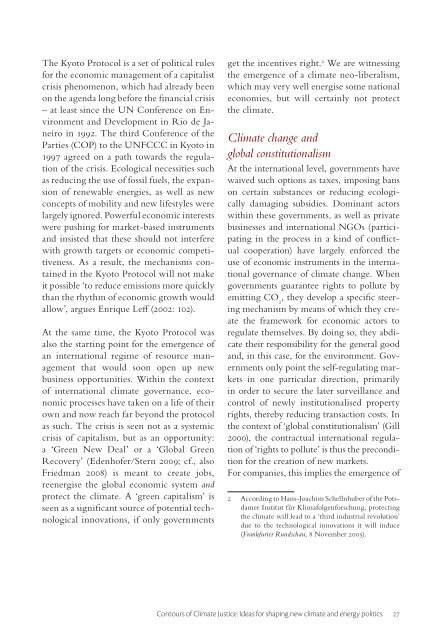Contours of Climate Justice - Dag Hammarskjöld Foundation
Contours of Climate Justice - Dag Hammarskjöld Foundation
Contours of Climate Justice - Dag Hammarskjöld Foundation
Create successful ePaper yourself
Turn your PDF publications into a flip-book with our unique Google optimized e-Paper software.
The Kyoto Protocol is a set <strong>of</strong> political rules<br />
for the economic management <strong>of</strong> a capitalist<br />
crisis phenomenon, which had already been<br />
on the agenda long before the fi nancial crisis<br />
– at least since the UN Conference on Environment<br />
and Development in Rio de Janeiro<br />
in 1992. The third Conference <strong>of</strong> the<br />
Parties (COP) to the UNFCCC in Kyoto in<br />
1997 agreed on a path towards the regulation<br />
<strong>of</strong> the crisis. Ecological necessities such<br />
as reducing the use <strong>of</strong> fossil fuels, the expansion<br />
<strong>of</strong> renewable energies, as well as new<br />
concepts <strong>of</strong> mobility and new lifestyles were<br />
largely ignored. Powerful economic interests<br />
were pushing for market-based instruments<br />
and insisted that these should not interfere<br />
with growth targets or economic competitiveness.<br />
As a result, the mechanisms contained<br />
in the Kyoto Protocol will not make<br />
it possible ‘to reduce emissions more quickly<br />
than the rhythm <strong>of</strong> economic growth would<br />
allow’, argues Enrique Leff (2002: 102).<br />
At the same time, the Kyoto Protocol was<br />
also the starting point for the emergence <strong>of</strong><br />
an international regime <strong>of</strong> resource management<br />
that would soon open up new<br />
business opportunities. Within the context<br />
<strong>of</strong> international climate governance, economic<br />
processes have taken on a life <strong>of</strong> their<br />
own and now reach far beyond the protocol<br />
as such. The crisis is seen not as a systemic<br />
crisis <strong>of</strong> capitalism, but as an opportunity:<br />
a ‘Green New Deal’ or a ‘Global Green<br />
Recovery’ (Edenh<strong>of</strong>er/Stern 2009; cf., also<br />
Friedman 2008) is meant to create jobs,<br />
reenergise the global economic system and<br />
protect the climate. A ‘green capitalism’ is<br />
seen as a signifi cant source <strong>of</strong> potential technological<br />
innovations, if only governments<br />
get the incentives right. 2 We are witnessing<br />
the emergence <strong>of</strong> a climate neo-liberalism,<br />
which may very well energise some national<br />
economies, but will certainly not protect<br />
the climate.<br />
<strong>Climate</strong> change and<br />
global constitutionalism<br />
At the international level, governments have<br />
waived such options as taxes, imposing bans<br />
on certain substances or reducing ecologically<br />
damaging subsidies. Dominant actors<br />
within these governments, as well as private<br />
businesses and international NGOs (participating<br />
in the process in a kind <strong>of</strong> confl ictual<br />
cooperation) have largely enforced the<br />
use <strong>of</strong> economic instruments in the international<br />
governance <strong>of</strong> climate change. When<br />
governments guarantee rights to pollute by<br />
emitting CO 2 , they develop a specifi c steering<br />
mechanism by means <strong>of</strong> which they create<br />
the framework for economic actors to<br />
regulate themselves. By doing so, they abdicate<br />
their responsibility for the general good<br />
and, in this case, for the environment. Governments<br />
only point the self-regulating markets<br />
in one particular direction, primarily<br />
in order to secure the later surveillance and<br />
control <strong>of</strong> newly institutionalised property<br />
rights, thereby reducing transaction costs. In<br />
the context <strong>of</strong> ‘global constitutionalism’ (Gill<br />
2000), the contractual international regulation<br />
<strong>of</strong> ‘rights to pollute’ is thus the precondition<br />
for the creation <strong>of</strong> new markets.<br />
For companies, this implies the emergence <strong>of</strong><br />
2 According to Hans-Joachim Schellnhuber <strong>of</strong> the Potsdamer<br />
Institut für Klimafolgenforschung, protecting<br />
the climate will lead to a ‘third industrial revolution’<br />
due to the technological innovations it will induce<br />
(Frankfurter Rundschau, 8 November 2005).<br />
<strong>Contours</strong> <strong>of</strong> <strong>Climate</strong> <strong>Justice</strong>. Ideas for shaping new climate and energy politics 27
















